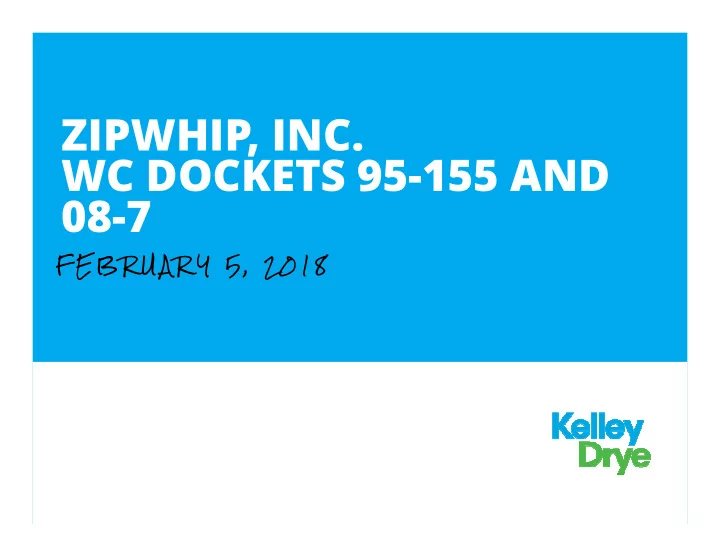

ZIPWHIP, INC. WC DOCKETS 95-155 AND 08-7 F E B R U A R Y 5 , 2 0 1 8 KATHLEEN W. CANNON DAVID E. FINK Partner Partner International Trade Media and Entertainment HENRY T. KELLY ROBERT I. STEINER Partner Partner Communications Litigation
Somos’s Cries of Wolf are Unpersuasive � Somos’s claims of an “urgent need” for action ring hollow � Well over 1 million toll-free numbers are actively using text today. These include major brands like Nestle, Butterball, Google and Instagram � Yet, Somos still relies on hypothesized harms to justify a land grab for its proprietary database There remains no evidence that subscribers are having their numbers improperly text-enabled � The principle of subscriber control over its number is alive and well in the texting industry, including toll-free texting � Zipwhip uses the same processes for 10-digit landline business numbers without problems 2
Zipwhip’s Authentication of Toll-Free Users is Working � Zipwhip’s verification process is consistent with CTIA messaging guidelines � Zipwhip continues to refine its processes, as one would expect in a functioning, competitive market. � During 2017, Zipwhip enhanced its spam protection procedures � For 2018, Zipwhip will introduce a 3 rd party verification process that will provide direct and indirect (i.e. reseller) customers access to the higher A2P throughputs of Zipwhip’s texting solutions 3
Somos’s Declaratory Ruling Petition Should Be Denied Procedurally improper � Inconsistent with declaratory ruling purpose, to clarify existing rules � not substantively change it or essentially create a new rule Identifies no statutory provision, rule or order that imposes the � requirements it seeks or is related to texting to toll-free Not wise policy � Proposal would undermine subscriber control and insert RespOrgs in � a controlling position Requested mandate would hinder innovation and potentially damage � a rapidly evolving marketplace Not needed � Industry-consensus guidelines in place to deal with proper verification � and consumer protection; Zipwhip compliant with these 4
Somos’s Request Is Contrary To Chairman Pai’s Regulatory Philosophy “Consumers benefit most from competition, not preemptive Somos’s request shuns competition � regulation. Free markets have delivered more value to in favor of a regulated market American consumers than highly regulated ones.” – Pai Regulatory Philosophy “No regulatory system should indulge arbitrage; regulators Somos’s request seeks regulatory � should be skeptical of pleas to regulate rivals, dispense favors favors, or otherwise afford special treatment.” - Pai Regulatory Philosophy “One could read the entire document . . . without finding Somos’s request relies on � anything more than hypothesized harms. Or, in other hypothesized harms words, public-utility regulation was a solution that wouldn’t work for a problem didn’t exist.” – Speech to Free State Foundation (Dec. 2016, discussing Open Internet Order) “Proof of market failure should guide the next Commission's Somos’s request doesn’t show � considerations of new regulations. And the FCC should only market failure adopt a regulation if it determines that its benefits outweigh its costs.” – Speech to Free State Foundation (Dec. 2016) “A . . . key FCC priority is promoting innovation across the Somos’ request undermines � communications industry.” “We want to encourage innovation, relies on a 1980’s innovation throughout the Internet economy. That means regulatory solution innovation not just at the edge of the network, but within the networks themselves.” – Speech to AEI (May 2017) 5
Somos’s Request Is Contrary To Chairman Pai’s Regulatory Philosophy And as Susan Dudley, George W. Bush’s regulatory czar once Somos’s petition has anecdotal � noted, “Anecdotes about outcomes we don’t like do not possibilities and no actual indicate market failure, nor do they present a sufficient demonstration of market failure argument for government intervention.” – Speech to Hudson Institute (Apr. 2017) “In most cases, [old rules that have been on the books for a Applying 1980s rules to the toll-free � while] simply don’t reflect the marketplace of today; and in texting market of today would some, they affirmatively harm consumers and competition impede innovation in text enabling by diverting investment and impeding innovation. – of numbers Testimony to House E&C Communications Subcommittee (Oct. 2017) “Our role at the FCC isn’t to support any particular company Somos seeks to replace a � or industry. Instead, we seek to foster a light-touch competitive framework with regulatory framework that permits all types of companies to preemptive regulation of toll-free compete in the communications marketplace. And then texting we’ll let American consumers choose who succeeds and who doesn’t. After all, competition is a far better guarantor of consumer welfare than preemptive regulation. “ Remarks at Cato Institute Policy Perspectives 2017 (Nov. 2017) 6
Recommend
More recommend